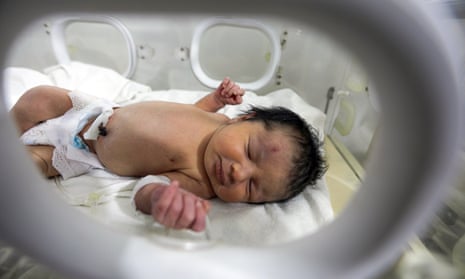Key events
Bashar al-Assad in Aleppo in first visit to earthquake-affected area
Reuters is reporting that the Syrian president, Bashar al-Assad, is in Aleppo to pay his first visit to a quake-affected area of the country.
Earlier this week, his regime was accused of playing politics with aid after the Syrian ambassador to the UN, Bassam Sabbagh, said his country should be responsible for the delivery of all aid into Syria, including those areas not under Syrian government control.
A picture of Syria’s President Bashar al-Assad is seen near the rubble of damaged building, in the aftermath of an earthquake, in Jableh, Syria February 9, 2023. REUTERS/Yamam al Shaar Photograph: Yamam Al Shaar/Reuters
If you haven’t already seen it, my colleague Ruth Michaelson’s piece on Recep Tayyip Erdoğan’s response to the disaster is well worth a read:
Erdoğan limited his interactions with the public in Pazarcık, instead driving directly to the local police headquarters to discuss the aftermath of the multiple massive tremors that left a trail of destruction over 10 Turkish provinces and across northern Syria, trapping people underneath collapsed buildings and killing more than 20,000.
When he did stop to speak briefly to the area’s shattered and distraught residents, it was to double down on the notion that the quake was solely responsible for the devastation, rather than poorly constructed buildings linked to corruption, or a rescue response beset by delays.

(Photo by Halil Fidan/Anadolu Agency via Getty Images) Photograph: Anadolu Agency/Getty Images
Turkey has postponed a natural gas summit due to be held on 14-15 February until 22 March, an energy official said on Friday.
Setting up a gas hub in Turkey was first proposed by Russia’s President Vladimir Putin after explosions damaged Russia’s Nord Stream gas pipelines under the Baltic Sea.
Turkey, currently imports all its gas needs and has extensive LNG import infrastructure. Ankara believes it can leverage its existing and new trade relations to become a gas hub.
Turkey also plans to start offshore gas production this year and ramp-up output over the next few years.
Separately, the Kremlin said on Thursday that the implementation of the Turkish hub had been delayed.
Some Western capitals were concerned that a Turkish hub including Russian gas could allow Moscow to mask exports that are sanctioned by the West over Russia’s invasion of Ukraine. (Via Reuters)
Steve Mannion, an orthopaedic surgeon with a charity that sends NHS professionals to disaster zones, has been talking to BBC Radio 4’s Today programme about the scenes and conditions he has witnessed in Turkey.
He said temperatures were below freezing in some places during the day and that doctors and nurses were tending to patients in tents and hospital car parks because the buildings were not safe.
Mannion added:
The level of devastation is truly awful. The number of houses that have been destroyed and the effect on the population is one of the worst I’ve seen.

Four days after the quake struck – and as Turkey prepares for parliamentary and presidential elections in May – familiar questions are being asked about the part that poorly observed construction codes may have played in the disaster. AP has this:
Turkey has for years tempted fate by not enforcing modern construction codes while allowing — and in some cases, encouraging — a real estate boom in earthquake-prone areas, experts say.
The lax enforcement, which experts in geology and engineering have long warned about, is gaining renewed scrutiny in the aftermath of this week’s devastating earthquakes, which flattened thousands of buildings and killed more than 20,000 people across Turkey and Syria.
“This is a disaster caused by shoddy construction, not by an earthquake,” said David Alexander, a professor of emergency planning at University College London.
It is common knowledge that many buildings in the areas pummelled by this week’s two massive earthquakes were built with inferior materials and methods, and often did not comply with government standards, said Eyup Muhcu, president of the Chamber of Architects of Turkey.
He said that includes many old buildings, but also apartments erected in recent years — nearly two decades after the country brought its building codes up to modern standards. “The building stock in the area was weak and not sturdy, despite the reality of earthquakes,” Muhcu said.
The problem was largely ignored, experts said, because addressing it would be expensive, unpopular and restrain a key engine of the country’s economic growth.
To be sure, the back-to-back earthquakes that demolished some 6,500 buildings were extremely powerful — their force magnified by the fact that they occurred at shallow depths. The first 7.8 magnitude quake occurred at 4.17am, making it even more difficult for people to escape their buildings as the earth shook violently. And President Recep Tayyip Erdoğan has acknowledged “shortcomings” in the country’s response.
But experts said there was a mountain of evidence – and rubble – pointing to a harsh reality about what made the quakes so deadly. Even though Turkey has, on paper, construction codes that meet current earthquake-engineering standards, they are too rarely enforced, explaining why thousands of buildings crumbled.
Since the disaster, Erdoğan’s minister of justice said their department would investigate the destroyed buildings. “Those who have been negligent, at fault and responsible for the destruction following the earthquake will answer to justice,” Bekir Bozdağ said om Thursday.
But several experts said any serious investigation into the root of weak enforcement of building codes must include a hard look at the policies of Erdoğan, as well as regional and local officials, who oversaw – and promoted – a construction boom that helped drive economic growth.
Builders commonly use lower quality materials, hire fewer professionals to oversee projects and don’t adhere to various regulations as a way of keeping costs down, according to Muhcu.
A teenager was pulled largely unscathed from the rubble of a collapsed building in the Turkish city of Gaziantep early on Friday, four days after the catastrophic earthquake struck.
Before dawn in Gaziantep, near the epicentre of the quake, rescuers pulled Adnan Muhammed Korkut from the basement where had been trapped since the quake on Monday. The 17-year-old smiled at the crowd of friends and relatives who chanted his name, clapped and wept tears of joy as he was carried out and put on to a stretcher.
“Thank God you arrived,” he said, embracing his mother and others who leaned down to kiss and hug him as he was being loaded into an ambulance. “Thank you everyone.”
Trapped for 94 hours, but not crushed, the teenager said he had been forced to drink his own urine to slake his thirst.
“I was able to survive that way,” he said.
“I have a son just like you,” a rescue worker, identified only as Yasemin, told him after giving him a warm hug. “I swear to you, I have not slept for four days. I swear I did not sleep; I was trying to get you out.” (Via AP)
Good morning. This is Sam Jones, taking over our liveblog coverage of the earthquake that has devastated southern Turkey and northern Syria. I’ll be bringing you updates on the aftermath of the disaster as the day goes on.
A Syrian baby girl whose mother died after giving birth to her under the rubble of their home during this week’s earthquake now has a name: Aya, Arabic for “a sign from God”.
With her parents and all her siblings killed, her great-uncle, Salah al-Badran, will take her in once she is released from the hospital.

However, his own house in the north-west Syrian town of Jenderis was destroyed, too. He and his family managed to escape the one-storey building, but now he and his household of 11 people are living in a tent, he told the Associated Press.
“After the earthquake, there’s no one able to live in his house or building. Only 10% of the buildings here are safe to live in and the rest are unliveable,” he said, communicating via voice messages:
Death toll rises to 21,719
The death toll in Turkey has risen to 18,342, bringing the total number of people killed to 21,719, a staggering number in just five days, and one expected to grow. It’s an increase of 668 people overnight.
According to the most recent updates from Syria, 3,377 have died there.
Australia has deployed a search and rescue team of 72 personnel to assist Turkish authorities.
The team will take with them about 22 tons of equipment and critical supplies, including tents, bandages, bolt cutters, chainsaws and drills, and will be self-sufficient.
Defense minister Richard Marles told reporters in Canberra on Friday the team “will make a real difference when they get on to the ground”.
He noted Australia earlier announced a contribution of $6.9 million to the aid efforts.
The rescue of several survivors from the rubble of buildings in Turkey lifted the spirits of weary search crews on Friday, four days after a major earthquake struck the country and neighbouring Syria, killing at least 20,000 people.
Cold, hunger and despair gripped hundreds of thousands of people left homeless by the tremors, the deadliest in the region for decades.
Several people were rescued from the rubble of buildings during the night, including a 10-year-old boy saved with his mother after 90 hours in the Samandag district of Hatay province, AP reports.
Also in Hatay, a seven-year-old girl named Asya Donmez was rescued after 95 hours and taken to hospital, the state-owned Anadolu news agency reported.
But hopes were fading that many more would be found alive in the ruins of thousands of collapsed buildings in towns and cities across the region.
The death toll from the 7.8 magnitude earthquake and several powerful aftershocks across both countries has surpassed the more than 17,000 killed in 1999 when a similarly powerful earthquake hit northwest Turkey.
It now ranks as seventh most deadly natural disaster this century, ahead of Japan’s 2011 tremor and tsunami and approaching the 31,000 killed by a quake in neighbouring Iran in 2003.
US grants aid licence pausing Syrian sanctions
The US Treasury Department said Thursday it had issued a licenCe to allow earthquake-related relief to get through that would otherwise be prohibited by sanctions on Syria.
“US sanctions in Syria will not stand in the way of life-saving efforts for the Syrian people,” deputy Treasury secretary Wally Adeyemo said in a statement. “While US sanctions programs already contain robust exemptions for humanitarian efforts, today Treasury is issuing a blanket General License to authorise earthquake relief efforts so that those providing assistance can focus on what’s needed most: saving lives and rebuilding.”
The license lasts for six months. It expands on broad humanitarian authorisations already in effect.
The United States will provide $85m in initial earthquake aid to Turkey and Syria, which will include medicine, shelter and other supplies, President Joe Biden announced. “Our hearts remain with the people of Türkiye and Syria,” he said on Twitter:
The United States will provide $85 million in urgently-needed aid in the wake of the Türkiye and Syria earthquakes – including food and shelter, supplies to help families brave the cold, and medicine to help save lives.
Our hearts remain with the people of Türkiye and Syria.
— President Biden (@POTUS) February 9, 2023
Death toll passes 21,000
More than 21,000 people have been killed in Turkey and Syria and thousands more injured as efforts continue for a fifth day in freezing conditions on Friday to save those still trapped under rubble.
Officials and medics said on Thursday that 17,674 people had died in Turkey and 3,377 in Syria, bringing the confirmed total to 21,051.
Summary
Hello, my name is Helen Sullivan and I’ll be bringing you the latest developments from the earthquakes that hit Turkey and Syria five days ago.
The death toll has now passed 21,000, exceeding the 20,000 that the World Health Organization initially projected when the quake first hit. The number of deaths is expected to climb in the coming days.
Rescue efforts are continuing for a fifth day in freezing conditions. Officials and medics said on Thursday that 17,674 people had died in Turkey and 3,377 in Syria, bringing the confirmed total to 21,051.
Meanwhile the US Treasury Department said Thursday it had issued a licence to allow earthquake-related relief that would otherwise be prohibited by sanctions to get through to Syria.
More on these stories shortly. In the meantime here are the key recent developments:
-
Turkey said almost 3,000 buildings had collapsed in seven different provinces, including public hospitals. A famous mosque dating back to the 13th century partially collapsed in the province of Maltaya, where a 14-story building with 28 apartments that housed 92 people collapsed.
-
The World Bank will provide $1.78bn (£1.47bn) to Turkey. Meanwhile, the US will send $85m in aid for Turkey and Syria. Immediate assistance of $780m would be offered via contingent emergency response components from two existing projects in Turkey, the bank said. Countries including France and Germany have also sent money and support, as has Greece, which has had long-term disputes with Turkey.
-
Britain is committing additional funding of £3m ($3.65m) to support search and rescue operations and emergency relief in Syria, the foreign ministry said on Thursday.
-
At least 28,044 people have been evacuated from Kahramanmaraş, one of the southern Turkish provinces hardest hit by Monday’s earthquake, including 23,437 by air and 4,607 by road and rail, Turkey’s disaster management agency said.
-
Rescuers continued to pull people who have been trapped for days out of the rubble, including a young girl trapped for three days.
-
Turkey’s disaster management agency, AHAD, said it has recorded almost 650 aftershocks since the two earthquakes – 7.8 and 7.6 in magnitude – struck, making rescue efforts even more difficult and dangerous as emergency teams comb through severely weakened buildings.
-
A Reuters report shed light on how hundreds of thousands of people made homeless by the quake are being housed in banks of tents erected in stadiums and shattered city centres, while Mediterranean and Aegean beach resorts outside the quake zone are opening up hotel rooms for evacuees.
-
The World Health Organization head, Tedros Adhanom Ghebreyesus, is on his way to Syria, where the WHO is part of the response. The UN will dispatch its aid chief, Martin Griffiths, to Gaziantep in Turkey and Aleppo and Damascus in Syria this weekend.
-
The WHO said up to 23 million people overall could be affected by the earthquake and promised long-term assistance. Adhanom Ghebreyesus said 77 national and 13 international emergency medical teams were deploying to the affected areas.
-
The US secretary of state, Antony Blinken, has spoken to Turkey’s finance minister, Mevlüt Çavuşoğlu, about how the US can provide assistance in Turkey and Syria. US state department spokesperson Ned Price said the US would continue to demand unhindered humanitarian access to Syria and urged Bashar al-Assad’s government to immediately allow aid through all border crossings.




















Discussion about this post